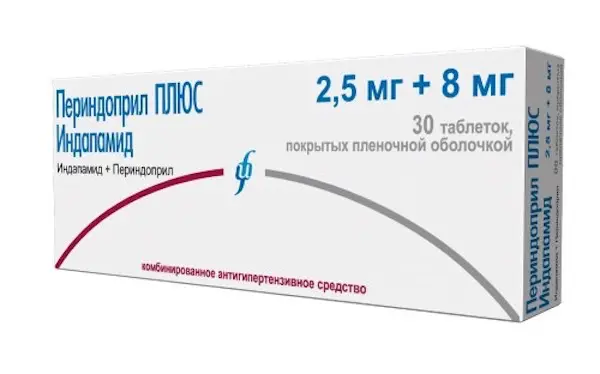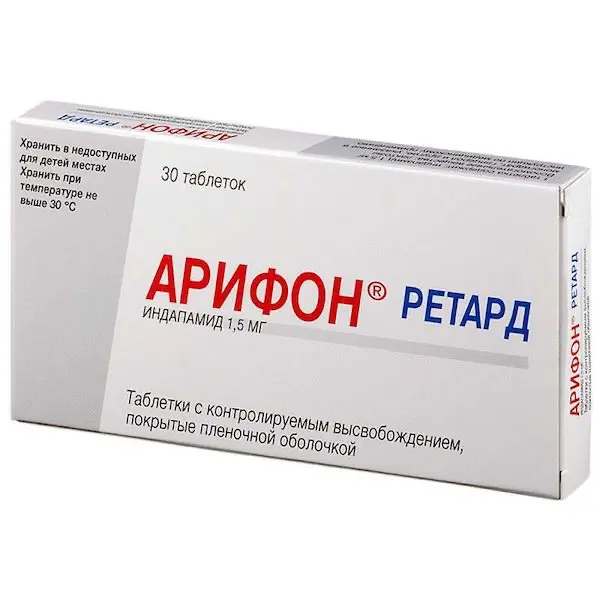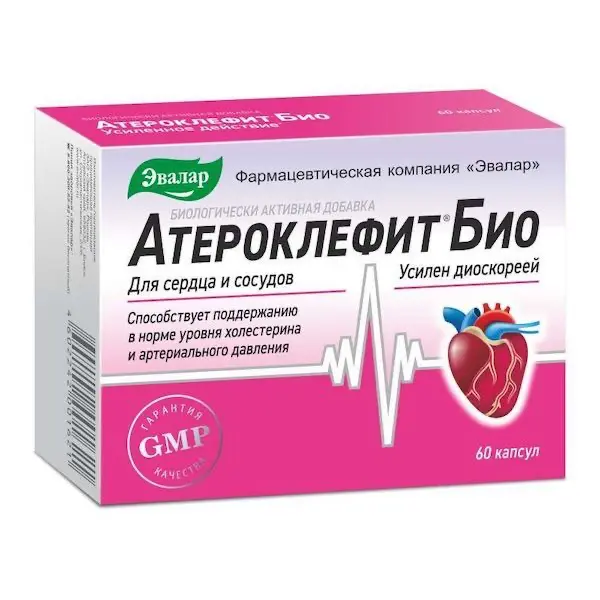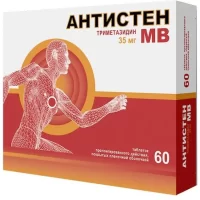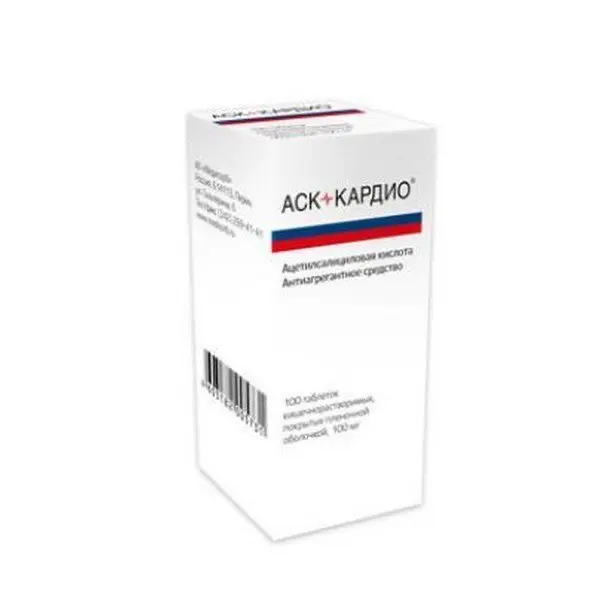Description
Perindopril+Indapamide Pharmacodynamics
Combined hypotensive drug containing angiotensin-converting enzyme (ACE) inhibitor – perindopril and thiazide-like diuretic – indapamide. The drug has antihypertensive, diuretic and vasodilatory effects.
Perindopril PLUS Indapamide has a pronounced dose-dependent antihypertensive effect, independent of the age and body position of the patient and not accompanied by reflex tachycardia. Does not affect lipid metabolism (total cholesterol, low-density lipoproteins (LDL), very low-density lipoproteins (VLDL), high-density lipoproteins (HDL), triglycerides (TG) and carbohydrates), including in diabetic patients. Reduces the risk of hypokalemia due to monotherapy with a diuretic.
The hypotensive effect persists for 24 hours.
Stable decrease in blood pressure (BP) is achieved within 1 month during the use of Perindopril PLUS Indapamide without an increase in heart rate (HR). Discontinuation of treatment does not lead to development of “withdrawal” syndrome.
Perindopril is an ACE inhibitor, whose mechanism of action is related to the inhibition of ACE activity, which leads to a decrease in angiotensin II formation, eliminates the vasoconstrictor effect of angiotensin II, reduces aldosterone secretion. The use of perindopril does not lead to retention of sodium and fluid, does not cause reflex tachycardia during long-term treatment. Hypotensive effect of perindopril develops in patients with low or normal plasma renin activity. Perindopril acts through its main active metabolite, perindoprilat. Its other metabolites are inactive.
The action of perindopril leads to vein dilation (reduction of cardiac preload) due to changes in prostaglandin metabolism; reduction of total peripheral vascular resistance (TPR) (reduction of cardiac postload).
In patients with heart failure perindopril promotes reduction of left and right ventricular filling pressures; increase of cardiac output and cardiac index; increase of regional blood flow in muscles.
Perindopril is effective in arterial hypertension of any severity: mild, moderate and severe.
The maximum hypotensive effect develops 4-6 hours after a single oral administration and lasts for 24 hours.
Discontinuation of therapy does not lead to the development of “withdrawal” syndrome.
It has vasodilator properties and restores elasticity of large arteries. Addition of a thiazide-like diuretic enhances the hypotensive (additive) effect of perindopril.
Indapamide refers to sulfonamide derivatives and is a diuretic. It inhibits sodium reabsorption in the cortical segment of the renal tubules, increasing renal excretion of sodium and chlorine, thus resulting in increased diuresis. To a lesser extent increases potassium and magnesium excretion. Having the ability to selectively block slow calcium channels, indapamide increases elasticity of arterial walls and reduces PPS. It has antihypertensive effect in doses that do not have a pronounced diuretic effect. Increasing the dose of indapamide does not increase the hypotensive effect, but increases the risk of adverse events. Indapamide in patients with arterial hypertension has no effect on lipid metabolism – TG, LDL and HDL; on carbohydrate metabolism, even in patients with diabetes mellitus and arterial hypertension.
Indications
Essential arterial hypertension (in patients who are indicated for combination therapy).
Contraindications
-Perindopril
– Hypersensitivity to perindopril and other ACE inhibitors;
– History of angioedema (Quincke’s edema) associated with ACE inhibitor administration;
– hereditary/idiopathic angioedema;
– Bilateral stenosis of the renal arteries or stenosis of the artery of the single kidney;
– concomitant use of ACE inhibitors with aliskiren and aliskiren-containing drugs in patients with diabetes mellitus and renal impairment (creatinine clearance (CK) less than 60 ml/min);
– pregnancy;
– breastfeeding;
– Under 18 years of age (efficacy and safety have not been established).
Indapamide .
– Hypersensitivity to indapamide and other sulfonamide derivatives;
– Severe hepatic insufficiency (including with encephalopathy);
– hypokalemia;
– concomitant use with drugs that can cause “pirouette” arrhythmia;
– Pregnancy and breast-feeding;
– Under 18 years of age (efficacy and safety have not been established).
Perindopril PLUS Indapamide
– Hypersensitivity to excipients included in the drug;
– Severe renal insufficiency (CKR <30 ml/min);
– concomitant use with potassium-saving diuretics, potassium and lithium preparations, and in patients with hyperkalemia;
– concomitant use of drugs that prolong the QT interval due to lack of sufficient clinical experience Perindopril PLUS Indapamide should not be used in patients on hemodialysis, as well as in patients with untreated decompensated heart failure;
– under 18 years of age (efficacy and safety have not been established).
Dosage and administration method
- Orally, preferably in the morning, on an empty stomach, 1 tablet of Perindopril-Indapamide Richter according to the selected dose 1 time/day.
- Appointment of the combined drug in a certain dose is possible after titration of the dose by the individual components of the drug in monotherapy. If there is a therapeutic effect, consideration should be given to immediately switch from monotherapy to treatment with Perindopril-Indapamide Richter.
- In elderly patients.
- Treatment should be initiated taking into account the decrease in BP and renal function.
- In renal failure.
- In severe renal failure (creatinine clearance less than 30 ml/min), treatment with Perindopril-Indapamide Richter is contraindicated. In moderate renal insufficiency (creatinine clearance 30-60 ml/min) it is recommended to start therapy with the combined drug depending on BP. In patients with creatinine clearance above 60 ml/min, dose adjustment is not required with regular monitoring of creatinine and potassium concentrations.
- In patients with hepatic impairment
- In severe hepatic impairment, treatment with this drug is contraindicated.
- No dosage adjustment is required in moderately severe hepatic impairment.
- Children and adolescents under 18 years of age
- Perindopril-Indapamide Richter should not be administered to children and adolescents due to the fact that the efficacy and safety of perindopril and indapamide in this age group, both alone and in combination with other active agents, have not been studied.

